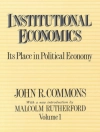German unification is changing central Europe, the EC andinternational economic and political relations. Prosperous West Germany with its "social market economy" has absorbedthe socialist GDR which is facing a complex systemictranformation process. This volume analyzes the causes, developments, and processes that are associated with Germanunification. The merger of the two Germanies provides aunique laboratory like example of institutional andeconomic changes against which established economic theoreisand economic policy concepts can be tested. Germanunification raises, of course, many new questions for Grmanyitself, Europe, and the whole international community. Willthe enlarged Germany become a new economic giant in Europeand can the FRG maintain stability and prosperity? Whatmacroeconomic and structural problems are faced by the new Germany and what are the effects for trade, investment, andgrowth in Germany`s partner countries? Will East Germanycatch up with the West and can this process serve as a modelfor Eastern Europe? What are the views of Poland and the USSR, and what implications arise for Western Europe and the United States? Finally, how isthe triangular relationshipbetween the U.S., the EC, and Japan affected, and how doesthis affect the United States` ability to organize economiccooperation with Japan, Germany, and other leadingeconomies?
Paul J.J. Welfens
Economic Aspects of German Unification [PDF ebook]
National and International Perspectives
Economic Aspects of German Unification [PDF ebook]
National and International Perspectives
购买此电子书可免费获赠一本!
语言 英语 ● 格式 PDF ● ISBN 9783642973796 ● 编辑 Paul J.J. Welfens ● 出版者 Springer Berlin Heidelberg ● 发布时间 2013 ● 下载 3 时 ● 货币 EUR ● ID 6338978 ● 复制保护 Adobe DRM
需要具备DRM功能的电子书阅读器












